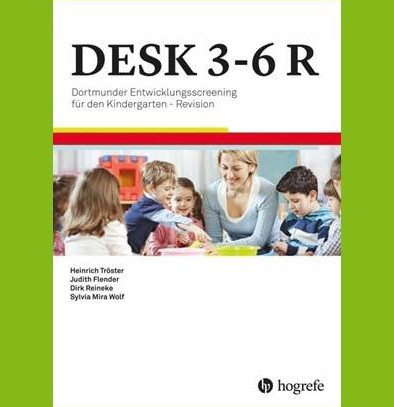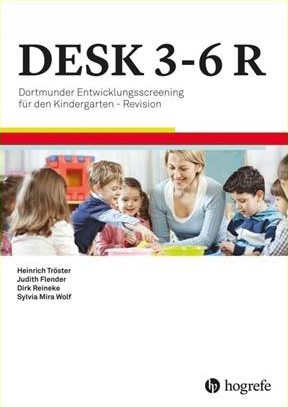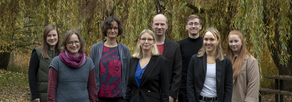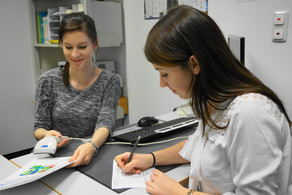Dortmunder Entwicklungsscreening für den Kindergarten - Revision
The Dortmunder Entwicklungsscreening für den Kindergarten - Revision [Dortmund Developmental Screening for Kindergarten - Revision] (DESK 3-6 R; Tröster, Flender, Reineke & Wolf, 2016) is a screening procedure for the early detection of developmental risks in preschool-aged children that was developed specifically for use in kindergarten. It aims to detect developmental risks of preschool children at an early stage in order to be able to initiate targeted support measures in time. The DESK 3-6 R is a revised version of the DESK 3-6 (Tröster, Flender & Reineke, 2004), which has been used regularly in many daycare centers since 2004 (cf. Franze, Gottschling & Hoffmann, 2010, 2011; Gottschling, Franze & Hoffmann, 2012).

The DESK 3-6 R is based on a systematic everyday behavioral observation of the child by the educator, in which - in contrast to a test-diagnostic examination - underlying competencies of the child are inferred on the basis of the behavior in everyday life (e.g., "Wait your turn."). However, not all competencies can be reliably inferred from the child's spontaneous behavior. Therefore, the observation tasks are supplemented by developmental tasks for which the educator must create specific challenge situations. The DESK 3-6 R contains three types of developmental tasks:
♦ Observation tasks.
Observation tasks are based on long-term observation of the child in everyday situations that make specific motor, social, emotional, communicative, or cognitive demands on children (e.g., "Stays with an activity even when distracted.").
♦ Group tasks
Group tasks are used to assess those child skills that cannot normally be reliably observed in everyday life and therefore need to be specifically assessed by the educator (e.g., "Balances forward in a toe-to-toe gait."). The group tasks will be performed in a group of no more than five children as part of a role play ("circus play").
♦ Individual tasks
With the individual tasks, the educator checks specific competencies of the child. To do this, she sets the child small tasks that can be integrated into the usual play activities and that allow her to specifically observe whether the child has a certain skill (e.g., "Traces a lying figure eight with a pencil.").
The group tasks are embedded in a role play ("circus game"). With the role play, the tasks can be reviewed with a maximum of five children in a playful context under largely controlled conditions, without confronting the children with a "test situation". The frame story is a "circus performance" consisting of individual, thematically related play scenes (e.g. "The ringmaster wants to make an announcement.", "The artists show their tricks with the ball."). One or more developmental tasks are embedded in each play scene. The children act out the scenes, giving the educator an opportunity to assess the developmental tasks embedded in that play scene. The circus play is conducted by two educators; one educator provides the "stage directions" for the role play, while a second educator observes the children's behavior as they complete the tasks and records the results of the behavioral observation. The following table shows an excerpt from the circus game for 5- and 6-year-old children.
The DESK 3-6 R consists of separate versions for three age groups, for 3-year-old children, for 4-year-old children and for 5- to 6-year-old children. The developmental tasks are each assigned to different developmental domains, the number of which increases with the age of the children, enabling a developmental prognosis that becomes increasingly differentiated with age. For an overview of the developmental domains in the three age groups, see Structure of the DESK 3-6 R.
The standardization of the DESK 3-6 R is based on a sample of 1711 children aged 3 to 6 years from a total of 66 daycare centers. Stanine norms were calculated for each developmental domain, for children aged 3 to 4 years in half-year increments, for children aged 5 and 6 years in year increments.
On the basis of the individual scales, a screening profile is created which shows in which developmental areas the child is at risk and therefore requires targeted support (see Table 3). In the screening profile, stanine values in the upper scale range were combined, since the DESK 3-6 R is not designed to differentiate in the upper scale range in order to diagnose any accelerated developments, but rather aims to reliably differentiate between children who have developed in line with their age and those who are developmentally at risk.
The DESK screening results in a three-level screening score in each developmental area. A stanine value of 3 and higher is an inconspicuous or negative screening result, which suggests that the child will develop in accordance with his or her age in the developmental area. A questionable screening finding (Stanine score = 2) is the first sign of increased developmental risk. A conspicuous or positive screening result (stanine value = 1) gives rise to a suspicion of a developmental risk in the developmental area concerned and is reason to clarify the child's problems in terms of developmental diagnostics and to initiate targeted support measures.
Through the early detection of developmental hazards, the DESK 3-6 R enables targeted support for the affected children in the daycare center. In addition, the results of the kindergarten screening can be used in the transition from kindergarten to elementary school in the sense of a proactive strategy to adapt the initial instruction to the individual learning requirements of the school beginners after school entry (cf. Tröster, in print). Specifically, the following areas of application arise:
♦ Routine procedures for developmental observation.
The DESK 3-6 R can be used as a routine procedure for developmental observation in the daycare center in order to identify specific support needs of children at an early stage. For this purpose, a screening profile is created which shows in which areas age-appropriate development can be expected and in which developmental areas the child has an increased need for support. The regular implementation of the DESK screening (once or twice a year) enables the documentation of the child's developmental progress over the entire preschool period (3 to 6 years).
♦ Evaluation of support measures in the daycare center.
The DESK 3-6 R can be used to check the effectiveness of support measures in the Kita. If, for example, targeted measures are implemented for children in the last year of kindergarten to promote their learning requirements at school, the DESK 3-6 R can be used to check the extent to which the learning requirements of children at risk have been improved.
♦ Use in the context of school readiness diagnostics.
Elementary school teachers can use the screening profile from the last year of kindergarten to adapt beginning instruction to the individual learning requirements of school-age children. From the DESK 3-6 R screening profile, they can determine which competencies the instruction can build on and in which competency areas the student needs special support. This enables the teacher to follow up on the individual learning requirements of the first-grader immediately after enrollment in the sense of a proactive strategy in their didactic approach. This strategy is likely to make the transition to school-based learning easier, especially for school beginners with limited learning prerequisites.
♦ Educational documentation
The DESK 3-6 R can be used to document a child's developmental progress throughout the preschool years. For this purpose, the screening should be conducted at regular intervals (approximately once or twice a year). The DESK 3-6 R documentation sheet is available for documenting the child's development. It can be used to document the results of the screening over the course of the preschool years (from the child's third to sixth year), as well as the results of the parent interviews and the support measures implemented.
More information
Practical experience with the DESK 3-6 R
Feedback and comments from kindergarten teachers
Within the scope of the standardization sample, a feedback sheet was issued to the participating KiTas. Here, the kindergarten teachers were asked to give specific feedback on the tasks and on the implementation. This feedback was directly incorporated into the new version of the DESK 3-6R. We have received a total of 47 responses. It becomes clear that observation sheets are used regularly in KiTas (76,6%), beside the DESK a multiplicity of sheets is used, in a high percentage (nearly 30%) own (arranged) procedures. This reflects the high demand for observation and documentation procedures. About half of the educators were already familiar with the DESK. The question about training for the DESK 3-6 R was answered by 31.9% as "not necessary", 48.9% as "desirable" and 14.9% as "absolutely necessary".
Presentedhere are individual comments made by educators about the DESK 3-6 R in response to the question "What did you like about the DESK 3-6 R?"

We offer information events and training events on DESK R 3-6.
Training academies, educational institutions, health authorities, kindergartens and schools or individual kindergartens and schools can book us for these events. Just give us a call or send us an email if you would like to book a training event for your institution or for a group of participants that you have already put together. The events can take place on a weekday as well as on the weekend. The contact persons are Dr. Sylvia Mira Wolf and Dr. Judith Flender.
Contact: Dr. Sylvia Mira Wolf
Department of Rehabilitation Sciences
Emil-Figge-Str. 50
44221 Dortmund, Germany
Prof. Dr. Heinrich Tröster
has been university professor for rehabilitation psychology at the Department of Rehabilitation Sciences at the University of Dortmund until 2019 and head of the early diagnosis research group. His research focuses on early diagnosis as well as on disease processing in families with chronically ill children.
Dr. Judith Flender, Dipl.-Psych.
Studied psychology at the Westphalian Wilhelms University of Münster. From 2001 to 2008 research assistant at the Technical University of Dortmund, Department of Rehabilitation Sciences (Psychological Diagnostics). 2005 doctorate. From 2008 to 2013 training as a child and adolescent psychotherapist, 2013 license to practice as a child and adolescent psychotherapist. 2013 - 2015 worked as a psychologist in the institute outpatient clinic of child and adolescent psychiatry. Since 2013 independent work in own practice, further education and training.
Dr. Sylvia Mira Wolf, Dipl.-Psych.
Psychology studies at the University of Bielefeld. From 1995 to 2007 worked as a psychologist in the field of interdisciplinary early intervention and in speech therapy kindergarten, kindergarten for the hearing impaired as well as diagnostics and monitoring of integrative kindergartens. Training as a systemic therapist, license to practice as a psychological psychotherapist. Since 2008 research associate at the Technical University of Dortmund, Department of Rehabilitation Sciences in the Research Unit of Rehabilitation Psychology (Psychological and Diagnostics) as well as in the field of rehabilitation and pedagogy in mental retardation. 2013 Dissertation. Collaboration at the Bielefeld Institute for Early Childhood Development e.V.
An overview of DESK 3-6 publications can be found at DESK 3-6 Publications.
The DESK 3-6 R was published by Hogrefe-Verlag in 2015 and can be obtained online from the Testzentrale Göttingen.
Persons involved Prof. Dr. Heinrich Tröster Dr. Judith Flender, Dipl.-Psych. Dr. Sylvia Mira Wolf, Dipl.-Psych. Contact
Contact
Prof. Dr. Heinrich Tröster If you have any questions, please contact the secretariat by e-mail.





